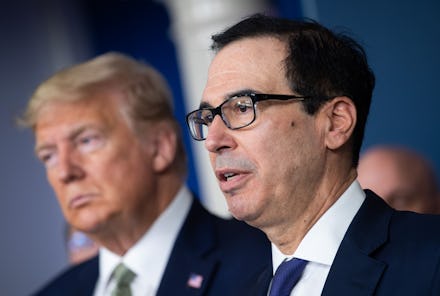Trump's coronavirus plan includes sending checks to Americans "immediately"

As the coronavirus crisis prepares to decimate the economy, various proposals are cropping up as to how the government can best mitigate the financial strain on businesses and individuals. On Tuesday morning, Fox News reported that the White House was proposing an $800 billion stimulus package to help keep the economy afloat. This package included $58 billion for airlines, $250 billion for Small Business Association loans, and a whopping $500 billion delivered through a payroll tax cut. Currently, employees pay 6.2% of their income to the government in payroll taxes; someone making $50,000 a year will pay $3,100 in payroll taxes, which goes toward programs like Social Security and unemployment. If workers don’t have to pay this amount, the thinking goes, then they’ll have more money available to spend, which will help keep the economy humming along.
President Trump has reportedly been trying to sell a complete cut in payroll taxes to Congress, but has been meeting stiff headwinds. “A payroll tax is one thing to be considered when there are certain economic indicators,” New York Rep. Alexandria Ocasio-Cortez (D) said on Fox News last week. “But right now, we are dealing with a pandemic. And so what we need to make sure is that we’re taking swift actions right now to protect doctors, to protect people on Medicaid, to make sure that people can see a doctor.”
Another prominent House Democrat, Maryland Rep. Steny Hoyer, called the payroll tax cut a “non-starter.” Even Senate Republicans were reportedly not interested in backing Trump’s plan. “I would prefer they exercise other options before going down that path,” said South Dakota Sen. John Thune.
The flaws with the proposal are glaring. A payroll tax cut obviously only helps people who remain on a payroll, for starters. The millions of Americans who will lose their jobs as a result of a coronavirus-induced economic slump — as well as the millions of freelancers and gig economy workers — will see no benefit. Furthermore, a payroll tax cut will not put much money immediately into the hands of taxpayers. Instead, the funds will be spread out across a multitude of paydays over the course of the year. This won’t provide much help to the people at risk of defaulting on a mortgage or rent payments in the immediate future.
Instead, a different idea has been rapidly gaining steam in recent days: simply writing checks to every adult American to help them deal with their most pressing financial needs. The specifics aren't 100% clear yet, but the Trump administration has floated an amount of at least $1000 and indicated it wouldn't necessarily send money to the ultra-wealthy.
Beyond just helping people maintain shelter and acquire food, a stipend could have far-reaching and broad economic benefits. If millions of people start defaulting on loans, for example, the economy could crater rapidly; immediate cash loans could help provide enough liquidity for people to continue paying off their debts and prevent an even larger crash. Some guerilla aid networks have already formed to try to alleviate these burdens — like The Ringer’s Shea Serrano mobilizing his vast Twitter army into a donation network — but government aid would of course be a more formalized and widespread fix.
Treasury Secretary Steven Mnuchin announced at a press conference Tuesday that the Trump administration is considering sending checks to people within the next two weeks.“The president has instructed me we have to do this now,” he said. “Americans need cash now and the president wants to give cash now. And I mean now, in the next two weeks.”
This proposal — which bears many similarities to former Democratic presidential candidate Andrew Yang’s proposal for a universal basic income of $1000 a month for every American — has surprisingly gained steam across the political spectrum.
On March 5, the economist Jason Furman, who worked in the Obama administration, wrote a column in The Wall Street Journal endorsing the idea of immediate cash aid of $1000 to every adult and $500 per child. “Given the mounting economic risks posed by the spread of the novel coronavirus, Congress should act swiftly but thoughtfully to pass fiscal stimulus,” he wrote. “This would be in addition to continuing to provide ample funding for medical research, testing, prevention, and treatment. The stimulus’s total cost would be about $350 billion, but could be larger or smaller depending on how the economic situation unfolds.”
Republicans have come onboard too. On Monday, Utah Sen. Mitt Romney endorsed a proposal to send $1000 to every American, and Arkansas Sen. Tom Cotton said too that he’s preparing legislation to provide cash stipends.
In an interview with TIME, Yang encouraged the government to follow through on his key policy proposal. “I’m incredibly excited by the fact that our government seems like they’re on the cusp of doing the common sense thing to help people get through this coronavirus crisis by putting cash straight into a family’s hands,” he said. Unexpected though it may be, it seems like the Yang Gang is on the cusp of a big policy victory in these unprecedented times.